- Home
- Neil Gaiman
The Graveyard Book
The Graveyard Book Read online
The Graveyard Book
Neil Gaiman
With Illustrations by Dave McKean
Rattle his bones
Over the stones
It’s only a pauper
Who nobody owns
TRADITIONAL NURSERY RHYME
Contents
Epigraph
1
How Nobody Came to the Graveyard
2
The New Friend
3
The Hounds of God
4
The Witch’s Headstone
5
Danse Macabre
Interlude
The Convocation
6
Nobody Owens’ School Days
7
Every Man Jack
8
Leavings and Partings
Acknowledgments
About the Author
Other Books by Neil Gaiman
Credits
Copyright
About the Publisher
CHAPTER ONE
How Nobody Came to the Graveyard
THERE WAS A HAND IN the darkness, and it held a knife.
The knife had a handle of polished black bone, and a blade finer and sharper than any razor. If it sliced you, you might not even know you had been cut, not immediately.
The knife had done almost everything it was brought to that house to do, and both the blade and the handle were wet.
The street door was still open, just a little, where the knife and the man who held it had slipped in, and wisps of nighttime mist slithered and twined into the house through the open door.
The man Jack paused on the landing. With his left hand he pulled a large white handkerchief from the pocket of his black coat, and with it he wiped off the knife and his gloved right hand which had been holding it; then he put the handkerchief away. The hunt was almost over. He had left the woman in her bed, the man on the bedroom floor, the older child in her brightly colored bedroom, surrounded by toys and half-finished models. That only left the little one, a baby barely a toddler, to take care of. One more and his task would be done.
He flexed his fingers. The man Jack was, above all things, a professional, or so he told himself, and he would not allow himself to smile until the job was completed.
His hair was dark and his eyes were dark and he wore black leather gloves of the thinnest lambskin.
The toddler’s room was at the very top of the house. The man Jack walked up the stairs, his feet silent on the carpeting. Then he pushed open the attic door, and he walked in. His shoes were black leather, and they were polished to such a shine that they looked like dark mirrors: you could see the moon reflected in them, tiny and half full.
The real moon shone through the casement window. Its light was not bright, and it was diffused by the mist, but the man Jack would not need much light. The moonlight was enough. It would do.
He could make out the shape of the child in the crib, head and limbs and torso.
The crib had high, slatted sides to prevent the child from getting out. Jack leaned over, raised his right hand, the one holding the knife, and he aimed for the chest…
…and then he lowered his hand. The shape in the crib was a teddy bear. There was no child.
The man Jack’s eyes were accustomed to the dim moonlight, so he had no desire to turn on an electric light. And light was not that important, after all. He had other skills.
The man Jack sniffed the air. He ignored the scents that had come into the room with him, dismissed the scents that he could safely ignore, honed in on the smell of the thing he had come to find. He could smell the child: a milky smell, like chocolate chip cookies, and the sour tang of a wet, disposable, nighttime diaper. He could smell the baby shampoo in its hair, and something small and rubbery—a toy, he thought, and then, no, something to suck—that the child had been carrying.
The child had been here. It was here no longer. The man Jack followed his nose down the stairs through the middle of the tall, thin house. He inspected the bathroom, the kitchen, the airing cupboard, and, finally, the downstairs hall, in which there was nothing to be seen but the family’s bicycles, a pile of empty shopping bags, a fallen diaper, and the stray tendrils of fog that had insinuated themselves into the hall from the open door to the street.
The man Jack made a small noise then, a grunt that contained in it both frustration and also satisfaction. He slipped the knife into its sheath in the inside pocket of his long coat, and he stepped out into the street. There was moonlight, and there were streetlights, but the fog stifled everything, muted light and muffled sound and made the night shadowy and treacherous. He looked down the hill towards the light of the closed shops, then up the street, where the last high houses wound up the hill on their way to the darkness of the old graveyard.
The man Jack sniffed the air. Then, without hurrying, he began to walk up the hill.
Ever since the child had learned to walk he had been his mother’s and father’s despair and delight, for there never was such a boy for wandering, for climbing up things, for getting into and out of things. That night, he had been woken by the sound of something on the floor beneath him falling with a crash. Awake, he soon became bored, and had begun looking for a way out of his crib. It had high sides, like the walls of his playpen downstairs, but he was convinced that he could scale it. All he needed was a step…
He pulled his large, golden teddy bear into the corner of the crib, then, holding the railing in his tiny hands, he put his foot onto the bear’s lap, the other foot up on the bear’s head, and he pulled himself up into a standing position, and then he half-climbed, half-toppled over the railing and out of the crib.
He landed with a muffled thump on a small mound of furry, fuzzy toys, some of them presents from relations from his first birthday, not six months gone, some of them inherited from his older sister. He was surprised when he hit the floor, but he did not cry out: if you cried they came and put you back in your crib.
He crawled out of the room.
Stairs that went up were tricky things, and he had not yet entirely mastered them. Stairs that went down however, he had discovered, were fairly simple. He did them sitting down, bumping from step to step on his well-padded bottom.
He sucked on his nummer, the rubber pacifier his mother had just begun to tell him that he was getting too old for.
His diaper had worked itself loose on his journey on his bottom down the stairs, and when he reached the last step, when he reached the little hall and stood up, the diaper fell off. He stepped out of it. He was only wearing a child’s nightshirt. The stairs that led back up to his room and his family were steep, but the door to the street was open and inviting….
The child stepped out of the house a little hesitantly. The fog wreathed around him like a long-lost friend. And then, uncertainly at first, then with increasing speed and confidence, the boy tottered up the hill.
The fog was thinner as you approached the top of the hill. The half-moon shone, not as bright as day, not by any means, but enough to see the graveyard, enough for that.
Look.
You could see the abandoned funeral chapel, iron doors padlocked, ivy on the sides of the spire, a small tree growing out of the guttering at roof level.
You could see stones and tombs and vaults and memorial plaques. You could see the occasional dash or scuttle of a rabbit or a vole or a weasel as it slipped out of the undergrowth and across the path.
You would have seen these things, in the moonlight, if you had been there that night.
You might not have seen a pale, plump woman, who walked the path near the front gates, and if you had seen her, with a second, more careful glance you would have realized that she was only moonlight, mist
, and shadow. The plump, pale woman was there, though. She walked the path that led through a clutch of half-fallen tombstones towards the front gates.
The gates were locked. They were always locked at four in the afternoon in winter, at eight at night in summer. Spike-topped iron railings ran around part of the cemetery, a high brick wall around the rest of it. The bars of the gates were closely spaced: they would have stopped a grown man from getting through, even stopped a ten-year-old child…
“Owens!” called the pale woman, in a voice that might have been the rustle of the wind through the long grass. “Owens! Come and look at this!”
She crouched down and peered at something on the ground, as a patch of shadow moved into the moonlight, revealing itself to be a grizzled man in his mid-forties. He looked down at his wife, and then looked at what she was looking at, and he scratched his head.
“Mistress Owens?” he said, for he came from a more formal age than our own. “Is that what I think it is?”
And at that moment the thing he was inspecting seemed to catch sight of Mrs. Owens, for it opened its mouth, letting the rubber nipple it was sucking fall to the ground, and it reached out a small, chubby fist, as if it were trying for all the world to hold on to Mrs. Owens’s pale finger.
“Strike me silly,” said Mr. Owens, “if that isn’t a baby.”
“Of course it’s a baby,” said his wife. “And the question is, what is to be done with it?”
“I daresay that is a question, Mistress Owens,” said her husband. “And yet, it is not our question. For this here baby is unquestionably alive, and as such is nothing to do with us, and is no part of our world.”
“Look at him smile!” said Mrs. Owens. “He has the sweetest of smiles,” and with one insubstantial hand she stroked the child’s sparse blond hair. The little boy giggled with delight.
A chilly breeze blew across the graveyard, scattering the fog in the lower slopes of the place (for the graveyard covered the whole of the top of the hill, and its paths wound up the hill and down and back upon themselves). A rattling: someone at the main gate of the graveyard was pulling and shaking it, rattling the old gates and the heavy padlock and chain that held them.
“There now,” said Owens, “it’s the babe’s family, come to bring him back to the loving bosom. Leave the little man be,” he added, because Mrs. Owens was putting her insubstantial arms around the toddler, smoothing, stroking.
Mrs. Owens said, “He dun’t look like nobody’s family, that one.” The man in the dark coat had given up on rattling the main gates and was now examining the smaller side gate. It, too, was well-locked. There had been some vandalism in the graveyard the previous year, and the council had Taken Steps.
“Come on, Mistress Owens. Leave it be. There’s a dear,” said Mr. Owens, when he saw a ghost, and his mouth dropped open, and he found himself unable to think of anything to say.
You might think—and if you did, you would be right—that Mr. Owens should not have taken on so at seeing a ghost, given that Mr. and Mrs. Owens were themselves dead and had been for a few hundred years now, and given that the entirety of their social life, or very nearly, was spent with those who were also dead. But there was a difference between the folk of the graveyard and this: a raw, flickering, startling shape the grey color of television static, all panic and naked emotion which flooded the Owenses as if it was their own. Three figures, two large, one smaller, but only one of them was in focus, was more than an outline or a shimmer. And the figure said, My baby! He is trying to harm my baby!
A clattering. The man outside was hauling a heavy metal garbage can across the alley to the high brick wall that ran around that part of the graveyard.
“Protect my son!” said the ghost, and Mrs. Owens thought it was a woman. Of course, the babe’s mother.
“What did he do to you?” asked Mrs. Owens, but she was not certain that the ghost could hear her. Recently dead, poor love, she thought. It’s always easier to die gently, to wake in due time in the place you were buried, to come to terms with your death and to get acquainted with the other inhabitants. This creature was nothing but alarm and fear for her child, and her panic, which felt to the Owenses like a low-pitched screaming, was now attracting attention, for other pale figures were coming from all over the graveyard.
“Who are you?” Caius Pompeius asked the figure. His headstone was now only a weathered lump of rock, but two thousand years earlier he had asked to be laid to rest on the mound beside the marble shrine, rather than to have his body sent back to Rome, and he was one of the most senior citizens of the graveyard. He took his responsibilities extremely seriously. “Are you buried here?”
“Of course she’s not! Freshly dead by the look of her.” Mrs. Owens put an arm around the woman-shape and spoke to it privately, in a low voice, calm and sensible.
There was a thump and a crash from the high wall beside the alley. The garbage can had fallen. A man clambered up onto the top of the wall, a dark outline against the mist-smudged streetlights. He paused for a moment, then climbed down the other side, holding on to the top of the wall, legs dangling, then let himself fall the last few feet, down into the graveyard.
“But my dear,” Mrs. Owens said to the shape, now all that was left of the three shapes that had appeared in the graveyard. “He’s living. We’re not. Can you imagine…”
The child was looking up at them, puzzled. It reached for one of them, then the other, finding nothing but air. The woman-shape was fading fast.
“Yes,” said Mrs. Owens, in response to something that no one else had heard. “If we can, then we will.” Then she turned to the man beside her. “And you, Owens? Will you be a father to this little lad?”
“Will I what?” said Owens, his brow crinkling.
“We never had a child,” said his wife. “And his mother wants us to protect him. Will you say yes?”
The man in the black coat had tripped in the tangle of ivy and half-broken headstones. Now he got to his feet and walked forward more carefully, startling an owl which rose on silent wings. He could see the baby and there was triumph in his eyes.
Owens knew what his wife was thinking when she used that tone of voice. They had not, in life and in death, been married for over two hundred and fifty years for nothing. “Are you certain?” he asked. “Are you sure?”
“Sure as I ever have been of anything,” said Mrs. Owens.
“Then yes. If you’ll be its mother, I’ll be its father.”
“Did you hear that?” Mrs. Owens asked the flickering shape in the graveyard, now little more than an outline, like distant summer lightning in the shape of a woman. It said something to her that no one else could hear, and then it was gone.
“She’ll not come here again,” said Mr. Owens. “Next time she wakes it’ll be in her own graveyard, or wherever it is she’s going.”
Mrs. Owens bent down to the baby and extended her arms. “Come now,” she said, warmly. “Come to Mama.”
To the man Jack, walking through the graveyard towards them on a path, his knife already in his hand, it seemed as if a swirl of mist had curled around the child, in the moonlight, and that the boy was no longer there: just damp mist and moonlight and swaying grass.
He blinked and sniffed the air. Something had happened, but he had no idea what it was. He growled in the back of his throat, like a beast of prey, angry and frustrated.
“Hullo?” called the man Jack, wondering if perhaps the child had stepped behind something. His voice was dark and rough, and there was an odd edge to it, as if of surprise or puzzlement at hearing himself speak.
The graveyard kept its secrets.
“Hello?” he called, again. He hoped to hear a baby cry or utter a half-word, or to hear it move. He did not expect what he actually heard, a voice, silky smooth, saying,
“Can I help you?”
The man Jack was tall. This man was taller. The man Jack wore dark clothes. This man’s clothes were darker. People who noticed the man J
ack when he was about his business—and he did not like to be noticed—were troubled, or made uncomfortable, or found themselves unaccountably scared. The man Jack looked up at the stranger, and it was the man Jack who was troubled.
“I was looking for someone,” said the man Jack, slipping his right hand back into his coat pocket, so the knife was hidden, but there if he needed it.
“In a locked graveyard, at night?” said the stranger.
“It was just a baby,” said the man Jack. “I was just passing, when I heard a baby cry, and I looked through the gates and I saw him. Well, what would anyone do?”
“I applaud your public-spiritedness,” said the stranger. “Yet if you managed to find this child, how were you planning to get out of here with it? You can’t climb back over the wall holding a baby.”
“I would have called until someone let me out,” said the man Jack.
A heavy jingling of keys. “Well, that would have been me, then,” said the stranger. “I would have had to let you out.” He selected one large key from the key ring, said “Follow me.”
The man Jack walked behind the stranger. He took his knife from his pocket. “Are you the caretaker, then?”
“Am I? Certainly, in a manner of speaking,” said the stranger. They were walking towards the gates and, the man Jack was certain, away from the baby. But the caretaker had the keys. A knife in the dark, that was all it would take, and then he could search for the child all through the night, if he needed to.

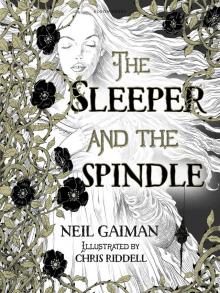 The Sleeper and the Spindle
The Sleeper and the Spindle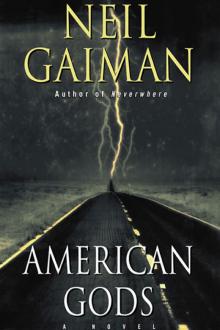 American Gods
American Gods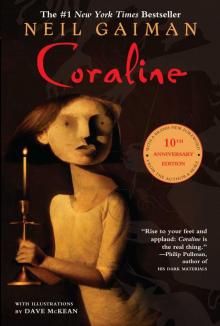 Coraline
Coraline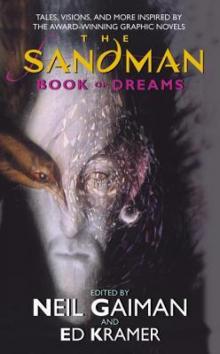 The Sandman: Book of Dreams
The Sandman: Book of Dreams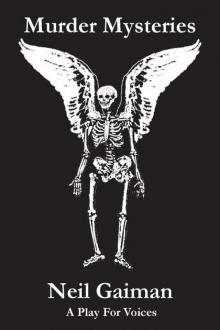 Murder Mysteries
Murder Mysteries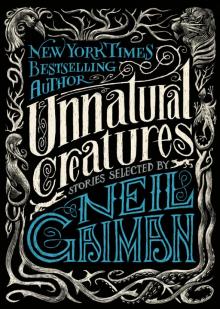 Unnatural Creatures
Unnatural Creatures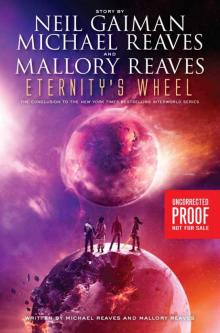 Eternity's Wheel
Eternity's Wheel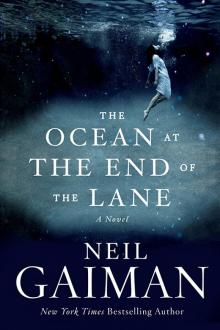 The Ocean at the End of the Lane
The Ocean at the End of the Lane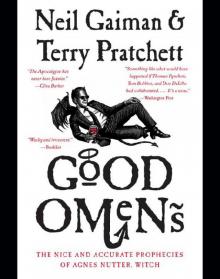 Good Omens
Good Omens Stardust
Stardust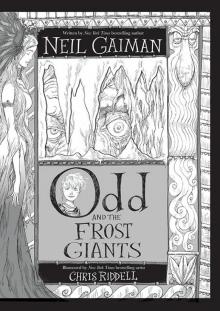 Odd and the Frost Giants
Odd and the Frost Giants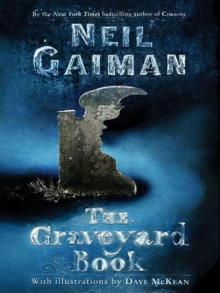 The Graveyard Book
The Graveyard Book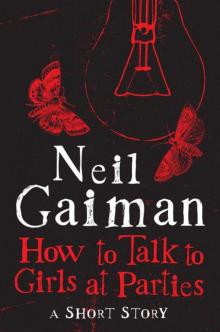 How to Talk to Girls at Parties
How to Talk to Girls at Parties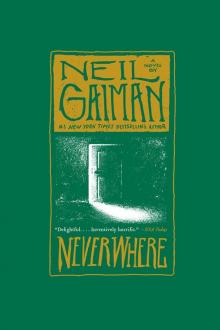 Neverwhere
Neverwhere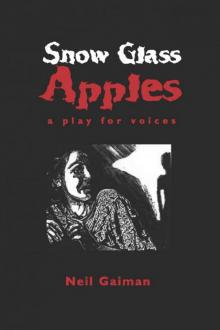 Snow, Glass, Apples
Snow, Glass, Apples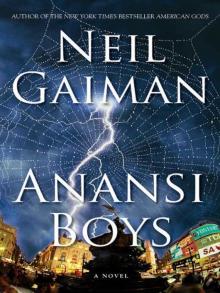 Anansi Boys
Anansi Boys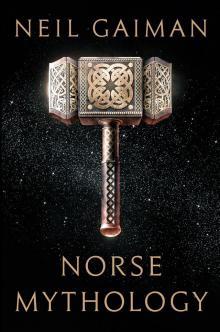 Norse Mythology
Norse Mythology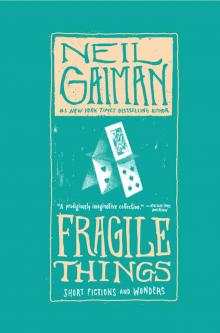 Fragile Things: Short Fictions and Wonders
Fragile Things: Short Fictions and Wonders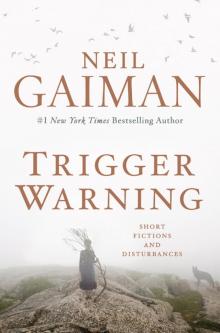 Trigger Warning: Short Fictions and Disturbances
Trigger Warning: Short Fictions and Disturbances InterWorld
InterWorld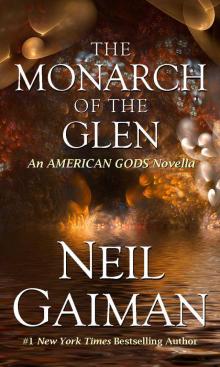 The Monarch of the Glen
The Monarch of the Glen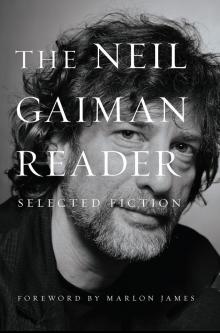 The Neil Gaiman Reader
The Neil Gaiman Reader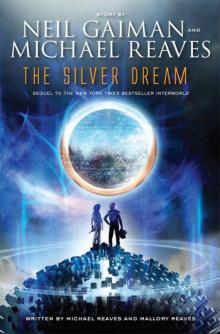 The Silver Dream
The Silver Dream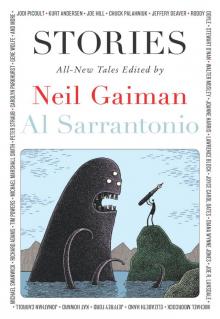 Stories
Stories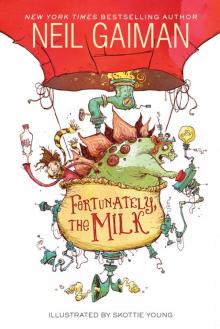 Fortunately, the Milk
Fortunately, the Milk Art Matters
Art Matters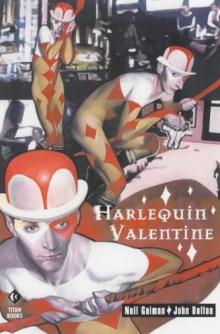 Harlequin Valentine
Harlequin Valentine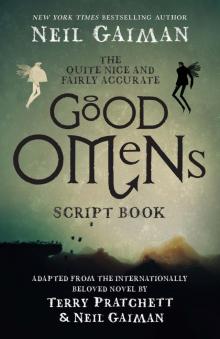 The Quite Nice and Fairly Accurate Good Omens Script Book
The Quite Nice and Fairly Accurate Good Omens Script Book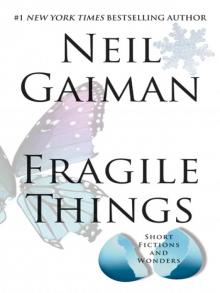 Fragile Things
Fragile Things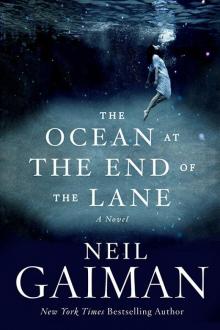 The Ocean at the End of the Lane: A Novel
The Ocean at the End of the Lane: A Novel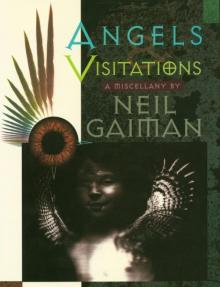 Angels and Visitations
Angels and Visitations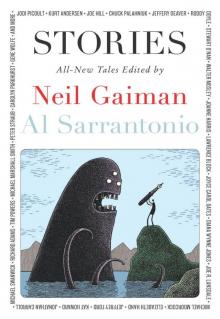 Stories: All-New Tales ngss-1
Stories: All-New Tales ngss-1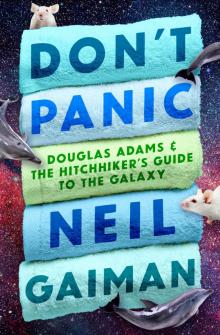 Don't Panic
Don't Panic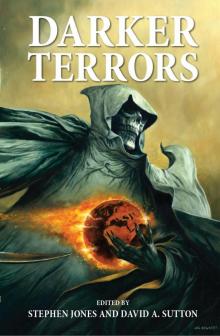 Darker Terrors
Darker Terrors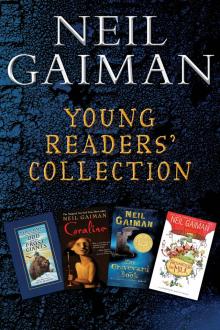 Neil Gaiman Young Readers' Collection
Neil Gaiman Young Readers' Collection A Study In Emerald
A Study In Emerald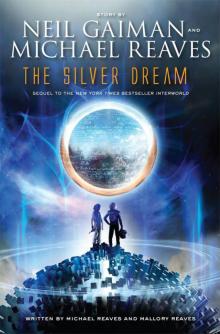 The Silver Dream: An InterWorld Novel
The Silver Dream: An InterWorld Novel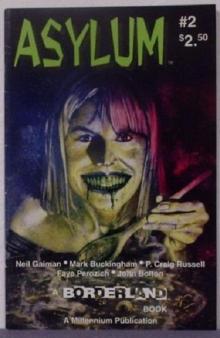 Feeders and Eaters
Feeders and Eaters Psychos
Psychos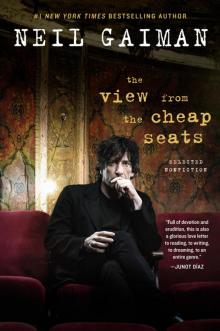 The View from the Cheap Seats
The View from the Cheap Seats Trigger Warning
Trigger Warning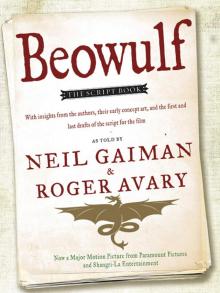 Beowulf
Beowulf Nessun Dove
Nessun Dove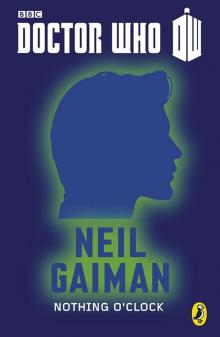 Doctor Who: Nothing O'Clock: Eleventh Doctor: 50th Anniversary
Doctor Who: Nothing O'Clock: Eleventh Doctor: 50th Anniversary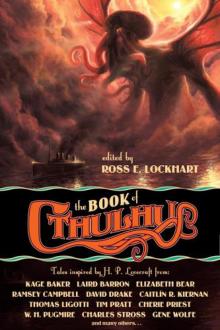 The Book of Cthulhu
The Book of Cthulhu